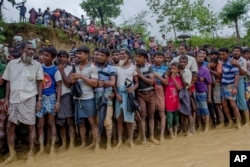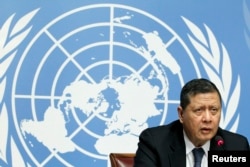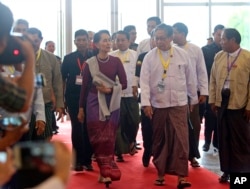Myanmar's de-facto leader Aung San Suu Kyi has condemned human rights violations taking place in western Rakhine state, where ongoing violence has led more than 400,000 ethnic Rohingya Muslims to flee to neighboring Bangladesh in recent weeks.
But in a highly anticipated national speech from the capital, Naypyitaw, Tuesday, the Nobel Peace laureate refused to assess blame on Myanmar's security forces, who have been accused of engaging in “ethnic cleansing” against the Rohingya.
Aung San Suu Kyi has come under strong international criticism for not speaking out more forcefully on the situation. She canceled her appearance at the United Nations General Assembly this week in part to address the ongoing crisis at home.
She told a group of foreign diplomats in attendance that her country does not fear international scrutiny, and offered her assurance that any human rights violations or “acts that impair stability and harmony” will be dealt with “in accordance with strict norms of justice.”
But she insisted that all “allegations are based on solid evidence before we take action.”
“It is not the intention of the Myanmar government to apportion blame or to abnegate responsibility,” she said.
Balancing act for leader
Independent analyst Richard Horsey told VOA Aung San Suu Kyi had to balance international concerns about the plight of the Rohingya with nationalist sentiments among the country's majority Buddhists:
“I think the content of the speech demonstrated very clearly how fine a line she feels she has to tread between what really are diametrically opposed views between the majority of people in Myanmar and much of the international community,” he said.
Rohingya militants attacked Burmese security forces in late August. Since then, analysts and rights workers say the Burmese military has carried out a brutal crackdown that has burned entire villages and killed fleeing women and children.
Human rights watchdog Amnesty International reacted to Tuesday's speech with skepticism. Regional director James Gomez issued a statement saying Aung San Suu Kyi and her government “are still burying their heads in the sand over the horrors unfolding in Rakhine State,” and said the speech “amounted to little more than a mix of untruths and victim blaming.”
Aung San Suu Kyi also said Myanmar will set up a verification process for those refugees who wish to return home, and vowed their request “will be accepted without hesitation.”
During a call Tuesday with Aung San Suu Kyi, U.S. Secretary of State Rex Tillerson commended Myanmar's decision to allow those displaced by the violence to return home, and he urged the government to facilitate humanitarian aid for those still displaced, according to a readout of the call.
Request for mandate extension
In Geneva Tuesday, Marzuki Darusman, the head of the United Nations’ fact-finding mission on Myanmar, asked the Human Rights Council to extend the mission's mandate until next September. Myanmar has refused the allow the U.N. investigators to enter the country, but Darusman told the Council that Aung San Suu Kyi’s comments “bode well” for the potential success of the mission.
However, Htin Lynn, Myanmar's ambassador to the U.N.-backed council, told the panel his government “reiterates its position dissociating from the resolution” that created the fact-finding mission.
The world body's International Organization for Migration updated its estimate of the number of Rohingyas who have fled to Bangladesh at 421,000.
Satellite photos show destruction
Satellite imagery of the Rakhine State released Tuesday by Human Rights Watch shows near total destruction in more than 200 villages.
“(The pictures) show the destruction of tens of thousands of homes across Maungdaw and Rathedaung Townships, part of the Burmese security forces' campaign of ethnic cleansing that has forced over 400,000 Rohingya Muslims to flee to neighboring Bangladesh,” HRW said in a statement accompanying the photos.
Kicking off the United Nations General Assembly Tuesday, U.N. Secretary-General Antonio Guterres said he was “shocked by the dramatic escalation of secretarial tensions” in Myanmar, and he called on authorities to “end the military operations” in Rakhine.
“They must also address the grievances of the Rohingya whose people have been left and resolved for far too long,” Guterres said in his speech in New York.
Sideline meeting on situation
A day earlier, on the sidelines of the UNGA, diplomats from the United States, Britain and other countries concerned about the humanitarian crisis in Rakhine called for an end to the violence and for measures to relieve Rohingya refugees’ suffering. U.S. Ambassador Nikki Haley said Monday diplomats held a “productive meeting about the dire situation,” but that no improvement has been seen on the ground in the area where displaced Rohingyas have been fleeing into Bangladesh.
“We continue to hear reports of violence and suffering,” Haley said afterwards. “People are still at risk of being attacked or killed, humanitarian aid is not reaching the people who need it, and innocent civilians are still fleeing across the border to Bangladesh.”
British Foreign Secretary Boris Johnson convened the meeting with Haley, Myanmar's national security adviser and deputy foreign minister, and other senior officials. Ministers from Bangladesh, Indonesia, Turkey, Australia, Canada, Sweden and Denmark attended the private meeting.
In addition to their call for an end to violence and full, unimpeded access for humanitarian workers from the United Nations and other agencies, Johnson said the ministerial group felt that “while Burma has undoubtedly made encouraging progress towards democracy in the last few years, the situation in Rakhine, the terrible human-rights abuses and violence are a stain on the country's reputation.”








